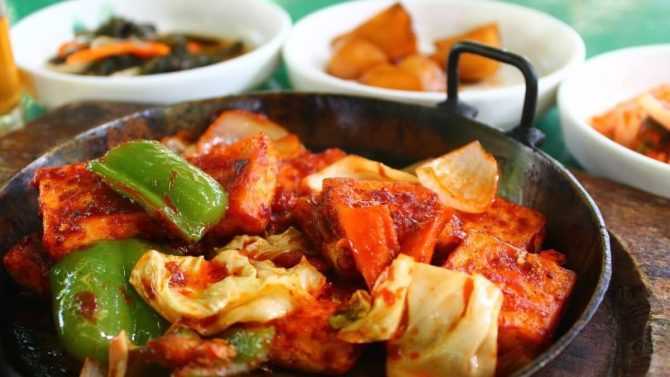
Spicy Food
How much spice is too much? Some people love spicy food. In many cultures, ingredients like chilies and hot pepper are common. Other cultures use garlic, ginger, or horseradish to spice up their food. Many people in the United States love hot sauce. They use it on almost everything from eggs to sandwiches! If you ask an American, they will probably have a favorite brand of hot sauce they like to use.
Spicy food can be good for your body. It can help with congestion if you have a cold. It can make you sweat, which cools your skin off. In hot countries, many people eat spicy food all the time so that they can feel cooler. However, if you are not used to spicy food, it can make you feel sick. It sometimes causes indigestion or just burns your tongue. It’s important to be careful and drink a lot of water if you are new to eating spicy food. Some people even drink milk, as it can help stop the spread of the heat.
Bryan and Carly are talking about some spicy food that Carly ate. Find out what they think about it in this English lesson.
Dialogue
Carly: Bryan, I went out to eat today, and my food was so spicy that it gave me indigestion. And I used to love spicy food! But now, I don’t know what it’s doing to my body. It’s making me sweat, and it’s causing a stomach ache.
Bryan: Oh, I love spicy food. I actually kind of like it when it makes my eyes water. I just feel like I’m enjoying to food a little bit more. But I also love the taste of peppers and chili…
Carly: Oh, yum.
Bryan: I think that’s a really, really strong taste, and it really hits home for me.
Carly: Yeah, I do like to try different types of hot sauces, because some of them aren’t necessarily spicy, but they’re smoky and have different flavors. I had a Jamaican hot sauce the other day that was delicious. So, those don’t hit me the same way as like going out to eat and getting spicy food from a restaurant. I have more control over it that way.
Bryan: Right, I love like jalapeno peppers or habanero peppers, but I can’t stand Tabasco sauce.
Carly: Oh, really?
Bryan: Like that’s a different type of heat that I can’t take.
Carly: See, and wasabi is a little strange for me. But I don’t know, maybe, I’ll venture out and try some new types of food.
Discussion
Carly just ate some very spicy food. She used to love eating spicy food, but now it makes her feel sick. It makes her sweat and causes a lot of stomach pain. Bryan really likes the taste of spicy food. He loves hot peppers. When his eyes water, he feels like he is just enjoying the food more. Strong, intense flavors are something he loves.
Carly also likes strong flavors. She enjoys hot sauce, but she prefers sauces that are more smoky than spicy. Bryan is the opposite. He can eat a lot of spicy peppers, but he can’t stand hot sauce. Carly doesn’t like the heat in wasabi. They both have very different tastes when it comes to eating spicy things.
Do you like spicy food? Do people in your country eat a lot of hot sauce?
Grammar Point
Bryan likes hot peppers, but not hot sauce. He says, “I love jalapeno peppers or habanero peppers, but I can’t stand Tabasco sauce.” He uses a conjunction.
A conjunction is a word that joins two or more words, phrases, or clauses. There are three kinds of conjunctions: coordinating, subordinating, and correlative.
There are only seven coordinating conjunctions. They are for, and, nor, but, or, yet, and so. Coordinating conjunctions join together parts of a sentence that are the same. For example, “Would you like pie or cake?” or, “John likes taking walks and riding his bike.”
Coordinating conjunctions can also join two independent clauses. For instance, you might say, “I love coffee,” and also, “It makes my stomach hurt.” You can join these clauses with a conjunction, saying, “I love coffee, but it makes my stomach hurt.”
Subordinating conjunctions allow us to join independent clauses with adverb clauses. For example, “I will bring dessert unless you are baking a cake,” or, “I cry whenever I watch that movie.” Other common subordinating conjunctions are although, because, before, if, since and while, but there are many more!
Correlative conjunctions are used in pairs and have the same function as coordinating conjunctions. For example, “Both Nate and Amy work at the library,” or, “Either Mom or Dad will pick you up from the airport.” In addition to both… and and either… or, other common correlative conjunctions are neither… nor, not… but, whether… or, and not only… but also.
We can tell that Brian used a coordinating conjunction. He could also use a different kind of conjunction. He could say something like, “Although I like jalapeno peppers, I can’t stand Tabasco sauce.”
Which is correct, “Each Sarah and Dan like sushi,” or, “Both Sarah and Dan like sushi”?
Quiz – Spicy Food
1. What happened to Carly after she ate spicy food?
A. She felt happy.
B. She had a cold.
C. She had indigestion.
D. She took a nap.
2. Bryan loves the taste of ___________________.
A. fish and hot sauce
B. jalapeno peppers and habanero peppers
C. red peppers and green peppers
D. horseradish and garlic
3. Sweat is __.
A. water from the skin that cools the body
B. a type of drink that’s good for the body
C. the way that sugar tastes
D. something you wear when it is cold
4. Which of the following is NOT a conjunction?
A. Since.
B. Although.
C. But.
D. Near.
Related Videos
Watch video clips to improve your English language skills.
#SpicyFood #HotCheetos #FoodInsider
